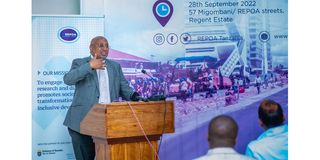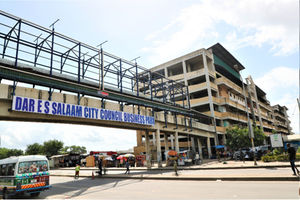Raise investment as rural-urban migration accelerates

Repoa’s executive director Donald Mmari. PHOTO | COURTESY
What you need to know:
- According to the study, Tanzania’s rate of urbanization is estimated to be about 15 percent and the urban population will grow to 35.5 million in 2030, and 76.5 million in 2050.
Dar es Salaam. If investment in urban planning is not prioritized as the rate of people moving from rural to urban areas is growing rapidly, there is a risk of the government being overwhelmed in providing social services, a study suggests.
The new findings of the study titled: The Transformation of Cities in Tanzania conducted by the research institute Repoa in collaboration with Friedrich Ebert Stiftung (FES) also touched on areas of public service and political participation, hence, suggesting that planning must begin as early as the year 2030.
According to the study, Tanzania’s rate of urbanization is estimated to be about 15 percent and the urban population will grow to 35.5 million in 2030, and 76.5 million in 2050. Dar es Salaam the biggest commercial city will have a population of over 10 million, thus will be by definition a mega-city.
“Urbanisation must go in line with the provision of social services so we also look at environmental issues, how cities can grow in a sustainable way, and manage to tolerate climate change, especially when cities are unplanned,” said Repoa’s executive director Donald Mmari.
He revealed this yesterday when launching the findings from the study conducted last year in three regions Dar es Salaam, Njombe and Arusha. The findings further showed that people with lower income, who are less educated and women were most likely to migrate to Dar es Salaam for economic reasons.
According to the study, migrants see better and improved access to services, especially for women, in urban areas, at least 70 percent of respondents agreed to improved access to all services such as better transport, recreation and entertainment, trade and market opportunities.
However, over a half of the respondents agreed or strongly agreed that migrating to Dar es Salaam created challenges and a threat to women, compared to those living in a rural area.
On other hand, FES resident director Elisabeth Bollrich said rapid urbanisation in Tanzania was a major challenge while at the same time there was little fiscal space to respond to the challenge.
She said residents of the three main regions mentioned an expectation that public service provision would be better in urban areas than in rural areas, but among city dwellers only a slight majority described actual government services provision in urban areas.
“We can do much better, FES already works as the just city platform in Tanzania, a group of likeminded people from civil society and academia who address challenges in the public transport and in the housing sector,” she said.



